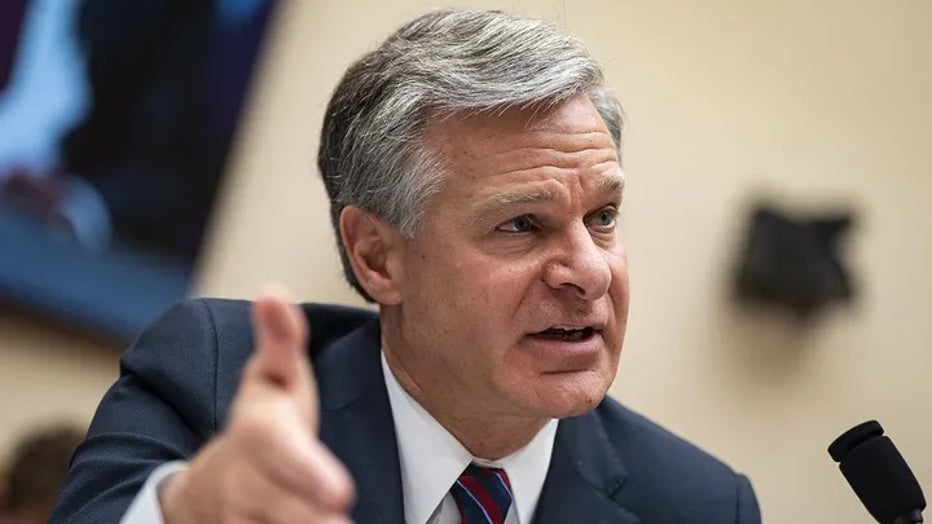FBI director warns of 'elevated' public, national safety; pushes for increased funding
FBI Director Christopher Wray told the House Appropriations subcommittee on Thursday that there is an increasing concern of a potential coordinated attack in the U.S., similar to the Islamic State in Khorasan Province (ISIS-K) attack last month at a concert hall in Russia.
Wray, who spoke before lawmakers to discuss the FY25 budget, said his agency needed additional funding to protect Americans from terrorism, adding that there has been a heightened risk of violence in the U.S. since Hamas-led terrorists invaded Israel on Oct. 7, 2024.
"Since then, we’ve seen a rogue’s gallery of foreign terrorist organizations call for attacks against Americans and our allies," Wray said. "Given those calls for action, our most immediate concern has been that individuals or small groups will draw twisted inspiration from the events in the Middle East to carry out attacks here at home. But now, increasingly concerning, is the potential for a coordinated attack here in the homeland, akin to the ISIS-K attack we saw at the Russia Concert Hall a couple of weeks ago."
On March 22, Moscow’s Crocus City concert hall was attacked by terrorists, leaving 137 people dead and over 180 wounded. The gunmen who conducted the attack were identified by Russian media as Tajik nationals. After walking in with automatic weapons, the terrorists indiscriminately opened fire on the 6,200-seat venue.
The Islamic State’s affiliate in Afghanistan, known as ISIS-K, claimed responsibility for the brutal attack.
Wray told members of the Congressional subcommittee that he would be "hard-pressed" to think of a time when so many threats to public safety and national security were all elevated at once, adding that it was the case as he sat before them.
"This is by no means a time to let up or dial back," he said. "This is a time when we need your support the most. We need all the tools, all the people, and all the resources required to tackle these threats and keep Americans safe."
One of the tools is Section 702 of the Foreign Intelligence Surveillance Act (FISA), which some GOP lawmakers say does not go far enough to safeguard Americans’ data. In fact, House Speaker Mike Johnson backed a bill to renew the controversial tool set to expire April 19, but over a dozen House GOP privacy hawks blocked the effort.
Wray told the committee the most indispensable tool Congress could give the FBI to fight foreign adversaries was the reauthorization of Section 702.
Featured
Israeli airstrike kills 3 sons, 4 grandchildren of Hamas leader in Gaza
Israeli airstrikes in the Gaza Strip killed three sons and four grandchildren of Hamas’ top political leader amidst delicate cease-fire negotiations with the militant group.
"It is critical in securing our nation, and we are in crunch time with our 702 authorities set to expire next week," Wray said. "So, let me be clear: Failure to reauthorize 702 or gutting it with some new kind of warrant requirement would be dangerous, and put Americans lives at risk."
According to the FBI director, Section 702 is crucial to identifying terrorists in the U.S. who are working with foreign terrorist organizations who publicly call for attacks on the country.
The tool helps the FBI find who the terrorists are working with to allow the FBI to stop them before they kill Americans, Wray said.
He also said Section 702 is crucial as China and Iran target Americans, the latter of which is known for kidnappings and assassinations.

FBI Director Christopher Wray speaks during a House Judiciary Committee hearing in Washington, DC, on Wednesday, July 12, 2023. (Al Drago/Bloomberg via Getty Images)
The tool also allows the FBI to fend off cyber threats, as well as threats to electricity, water and medical facilities.
Wray said if Congress allows Section 702 to lapse, which it is set to do next week, it will "massively increase the risk of missing crucial intelligence during a time of heightened national security threats across a whole multiple of fronts."
"Now is not the time for us to hang up our gloves, to take away tools we need to punch back. And failing to reauthorize 702 or gutting it with some kind of warrant requirement would be dangerous and put American lives at risk," he said. "I think if FISA were to expire, it adds one more challenge to our ability to secure us from foreign threats, including border-related threats."
"This is not a time for panic; it is a time for heightened vigilance," Wray added.
Among the GOP lawmakers who blocked the bill were: House Freedom Caucus Chair Bob Good, R-Va.; Rep. Nancy Mace, R-S.C.; Rep. Lauren Boebert, R-Colo.; Rep. Clay Higgins, R-La.; Rep. Chip Roy, R-Texas; and Rep. Matt Rosendale, R-Mont., among others.
One GOP lawmaker compared the amendment's effects to forcing a police officer to seek a warrant before querying a license plate in their database.
They explained that if a suspected terrorist overseas is communicating with a U.S. citizen at home, a Section 702 search would already pick up their specific communications with that U.S. citizen.
The amendment would force authorities to seek a warrant before seeing the contents of that communication, which critics have warned could waste valuable time in the event of a serious threat.
Read more via FOX News


